Isabela Padilha
B
Brittany Schwikert
AP Spanish Language 🇪🇸
54 resourcesSee Units
Our lifestyles are highly connected to the development of environmental issues. The way that we consume goods and interact with nature has a tremendous impact in the world. In this guide, we will explore some of the environmental issues that are topics of concern debated by nation-states and international organizations.
Environmental Issues
The onset of the 21st century has brought more debate about environmental issues than ever before. While some nations continue to ignore the warning signs of climate change, other countries are sounding the alarm bells and beginning to seek alternative policies and actions. Let’s take a look at some of the Earth’s biggest issues impacting Spanish speaking countries, as well as some emerging solutions.
Strive for Five Vocab 🔑🔑🔑
Inglés | Español | Definición / Ejemplos |
Climate change | El cambio climático | un cambio de clima atribuido directa o indirectamente a la actividad humana que altera la composición de la atmósfera mundial |
Single use plastic | Plástico de un solo uso | Botellas de plástico para bebidas, tapas de botellas, bolsas de supermercados, pajillas, colillas de cigarrillos, etc. |
Greenhouse gases | Gases de efecto invernadero | es un gas atmosférico que absorbe y emite radiación dentro del rango infrarrojo. Este proceso es la causa del efecto invernadero. |
Global warming | Calentamiento global | es el aumento a largo plazo de la temperatura media del sistema climático de la Tierra |
Natural resources | Recursos naturales | Agua, suelo (tierra), luz solar, minerales, gas natural, madera, viento, etc. |
Renewable energy sources | Energía renovables | La energía solar, la energía eólica (viento), la energía geotérmica, la biomasa, la energía hidráulica |
Deforestation | La desforestación | Destrucción o agotamiento de bosques naturales habitualmente debido a la acción humana |
Ecotourism | Ecoturismo | Enfoque para las actividades turísticas en el cual se privilegia la preservación y la apreciación de medio ambiente |
Plástico de un Solo Uso 🥤🥤🥤🥤
The United Nations has now predicted that in 2050 there will be more plastic in the ocean than fish 😨. In 2019, Ecuador joined México, Colombia, Perú and Chile in the fight for the elimination of single use plastic through La Alianza del Pacífico. Yet it may be too little too late, in the Galapagos excessive contamination of plastic has affected close to 20 different animal species. 😢🐢
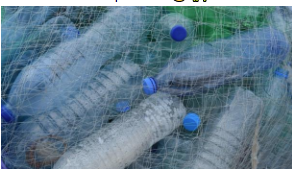
Gases de Efecto Invernadero / Calentamiento Global ☀️🌡️🥵
Quick refresh on science: Greenhouse gases are gases in Earth’s atmosphere that trap heat. They let sunlight pass through the atmosphere (good!), but they also prevent the heat that the sunlights brings in from leaving the atmosphere (bad!). The most important contributor to human-caused global warming is CO2.
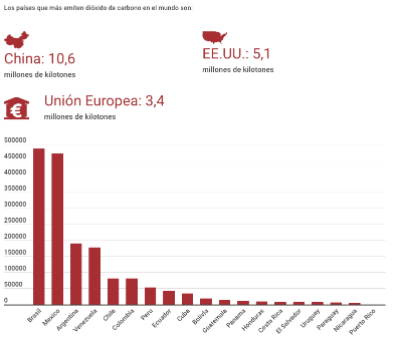
As you can see, not every country is as culpable for emitting CO2 gases as others. Latin America emits only 5% of global greenhouse gas emissions, according to a report by Programa de las Naciones Unidas para el Medio Ambiente (PNUMA). On the other hand, the US is the second leading nation for greenhouse gas emissions 😬.
Deforestación 🪓🌲🌿🌳🚜
Cutting down vast amounts of trees can release immense amounts of carbon that affects local and global climate, not to mention destroying biodiversity and the homes of thousands of species. Yet the biggest driver of deforestation is agriculture given the multiplying global population and increased food demands. Read the graph below to understand what are the main drivers and causes of deforestation, and what are some responses countries are taking.
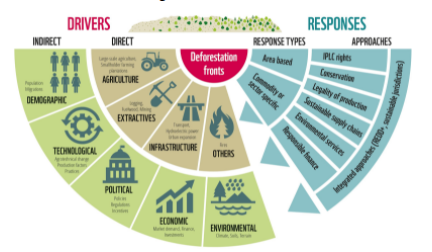
Proyectos de Energía Renovables ♻️📋💭
In the United States, renewable energy is gaining in popularity and usage, but fossil fuels are still the dominant form of energy. While on the other hand, Central America has the largest share of renewables (56%) in the world and the most diverse mixture of renewable generation, composed of biomass, geothermal, wind, and hydro. Costa Rica, El Salvador, Honduras, and Nicaragua have even developed some geothermal resources.

Image from Norton Rose Fulbright
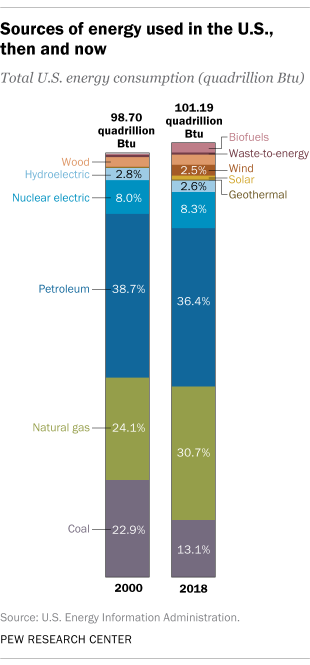
Image from Pew Research Center
Protección de Bosques 🐨🏞️🦥
The Amazon is a massive forest that stretches across Bolivia, Peru, Ecuador, Colombia, and Venezuela and other non-Spanish speaking countries like Brazil, Suriname, Guyana, and French Guiana. Here are some quick facts about why scientists are keen to protect forest habitat:
- One in ten species on Earth lives in the Amazon
- The Amazon contains 1.4 billion acres of dense forests, which accounts for half of the planet’s remaining tropical forests
- More than 350 Indigenous and ethnic groups live in the Amazon and depend on the forest’s natural resources for their survival
- There’s a clear link between the health of the Amazon and the health of the planet
- The rainforest, which contain 90-140 billion metric tons of carbon, help stabilize local and global climate
- Deforestation may release significant amounts of carbon, which could have catastrophic consequences around the world
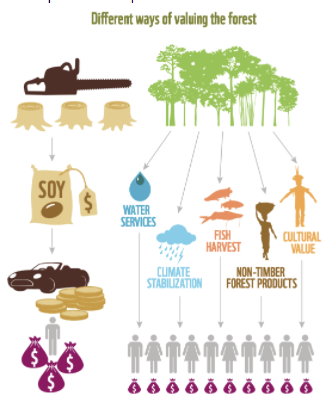
Image from WWF Living Amazon Report, 2016
Ecoturismo ⛰️🚣⛺
Costa Rica is one of the bright stars in ecotourism, luring in tourists through the country's 29 national parks, 19 wildlife refuges, 8 biological reserves and protected areas for animals. Realizing their wealth in beauty, the Costa Rican government has been quick to protect their natural treasures through the National System of Conversation Areas, preserving a quarter of the national territory.
🦜🦁🦋🦉🦎 Although Costa Rica is a small country, it makes up about 5% of the earth’s biodiversity (AKA, they have TONS of different types of animals!).
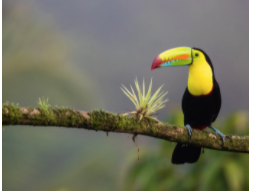
¡Vamos Practicar! - Task Model
Asista el seguinte video y analiza el gráfico del segundo link:
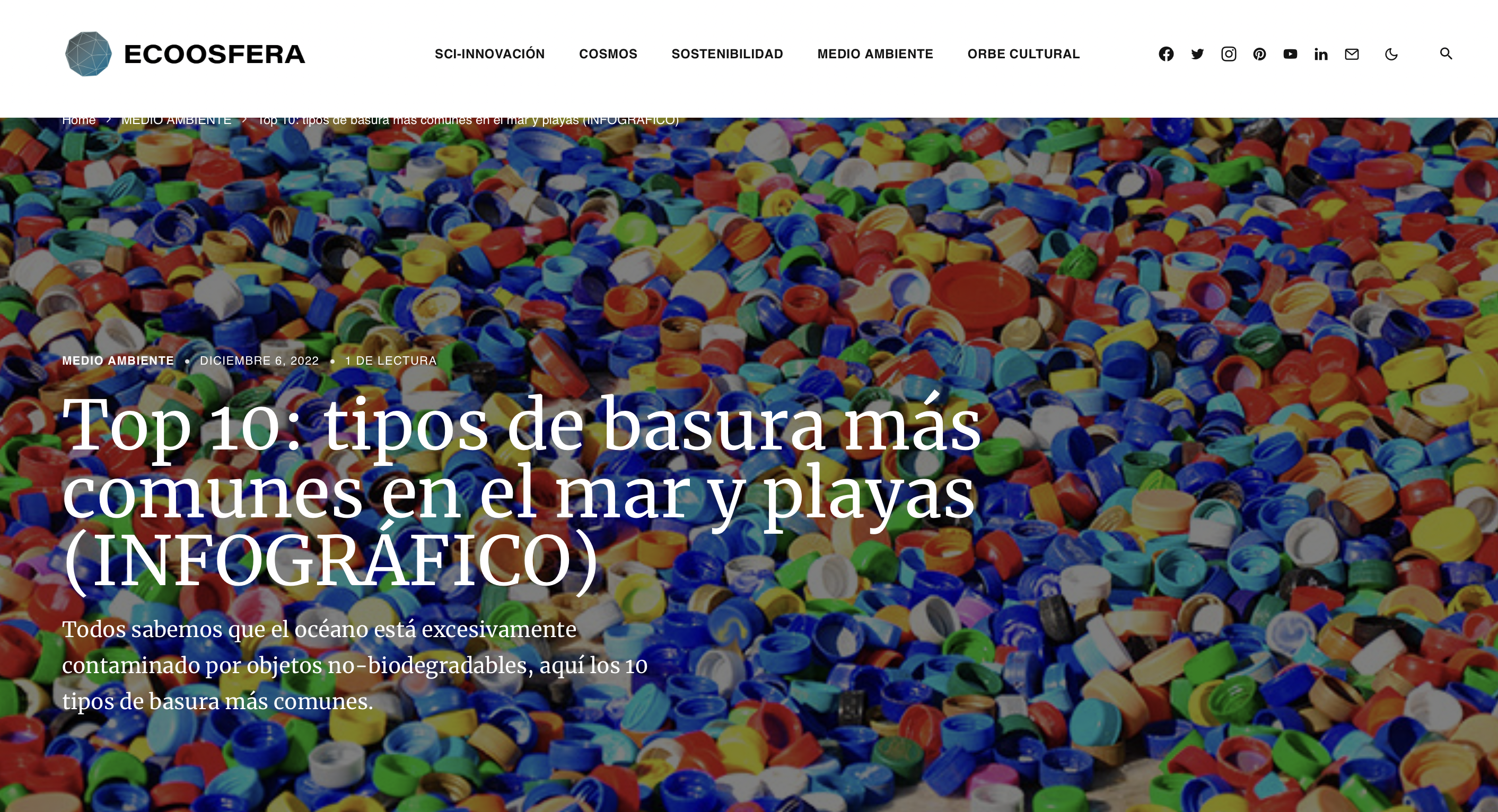
Responda o reflita sobre las seguintes preguntas: 🧐
1. Do you feel optimistic about the future of the environment? Why or why not? / ¿Tú se sientes optimista en relación al futuro del medio ambiente? Por qué o por qué no?
2. What do you think is the main action that individuals need to take now to take care of the environment? / ¿Que tú piensas que es la acción principal que los individuos deben tomar ahora para cuidar del medio ambiente?
3. In the first article, Peru's Minister of the Environment talks about abolishing plastic bags in supermarkets. Do you believe that is an efficient way to reduce plastic? / En el primero artículo, la Ministra del Ambiente de Peru habla sobre la abolición de bolsas plásticas en supermercados. ¿Tú crees que esta es una manera efectiva de disminuir el plástico?
Browse Study Guides By Unit
👨👩👧Unit 1 – Families in Spanish-Speaking Countries
🗣Unit 2 – Language & Culture in Spanish-Speaking Countries
🎨Unit 3 – Beauty & Art in Spanish-Speaking Countries
🔬Unit 4 – Science & Technology in Spanish-Speaking Countries
🏠Unit 5 – Quality of Life in Spanish-Speaking Countries
💸Unit 6 – Challenges in Spanish-Speaking Countries
📚Study Tools
🤔Exam Skills

Fiveable
Resources
© 2025 Fiveable Inc. All rights reserved.